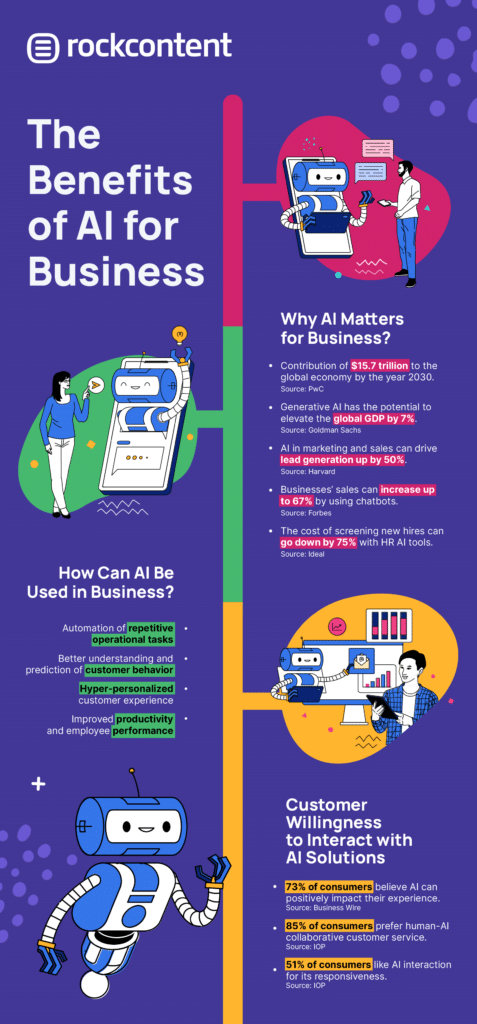These days, you no longer have to head to the movie theater or turn on your television set to experience a world where artificial intelligence is everywhere. That world is officially here and now on so many levels.
AI algorithms rule your favorite social media platforms, while numerous AI-powered programs make your smartphone as helpful and indispensable as it is. Popular AI programs like ChatGPT and Midjourney can even generate surprisingly human graphics, written content, and more.
But the more popular AI-powered technology becomes, the more important it is to know how to use it efficiently and responsibly. Many people still have questions about how it works and whether it can really be applied in different business segments.
Let’s go over a few of the key things to know.
Download this post by entering your email below
What Is Artificial Intelligence?
The term Artificial Intelligence is not a new concept.
In 1956, Professor John McCarthy coined it to refer to the ability of machines to solve problems that, until then, could only be solved by humans.
The concept of AI remains the same: machines thinking like humans; developing the ability to learn, reason, perceive, deliberate, and make logical decisions based on facts.
Another important aspect of AI is that, because of its ability to learn, it needs to be constantly fed to continue to evolve, like a person.
As complex as this process is, it is only possible with simple computing processes, such as:
- Data Modeling
Frameworks to intelligently process, categorize and analyze data.
- Big Data
Making large amounts of data available to be processed.
- Processing Power
The operational and logistical ability to process information quickly and efficiently.
Despite this brief explanation, to understand how AI works, you need to know that a combination of technologies makes it possible.
Technologies Enabling AI Functionality
AI is composed of code and data, with the former responsible for reading and interpreting the latter.
However, AI is more than just data analysis.
To fulfill a complex plethora of commands that can mimic humans, it relies on several technologies.
Machine Learning
The first pillar of AI is Machine Learning.
This is where computers evolve and become capable of learning. With this technology, logical processing of data and identification of patterns that generate intelligence take place.
Without Machine Learning, what we understand as AI would not materialize.
Today, for example, the technology is used extensively by Amazon to make more personalized and relevant recommendations to customers.
The system works as follows: the machine monitors all customer actions on a website and identifies patterns. Actions such as when customers who have seen product X also show interest in Y are great examples.
So, when a user does the first search, the system recommends the other product because it identifies a relationship between the searches.
In Machine Learning, these patterns are identified in infinite webs so that there are thousands of points of intersection consisting of connections between information, enabling intelligence on a large scale.
Deep Learning
Another essential concept for the achievement of today’s AI is Deep Learning.
This technology is a deeper version of Machine Learning, making it more intelligent and complex.
Deep Learning uses more sophisticated tools, making the results more accurate.
Going back to the Amazon example, the technology identifies exceptions so as not to make unqualified suggestions.
Imagine this: if out of 1000 customers searching for “smart TVs“, 800 continue their search with “home theater“, the software understands this is a relevant recommendation.
With Machine Learning, if five users start a search for “shoes” after searching for “smartTV“, the system could assume it is a valid recommendation.
Systems that rely on Deep Learning, however, know that these are unrelated products, preventing exceptions from becoming rules when it comes to user behavior.
Deep Learning uses more complex networks to conclude that this example is not a causal search. Although there is an occurrence, it is not a relevant result for the user.
In this sense, Deep Learning is able to understand human thoughts in more detail than Machine Learning.
Natural Language Processing (NLP)
The last pillar of AI is Natural Language Processing (NLP).
This is responsible for polishing results, making them more natural and human-like.
For example, several e-commerce businesses currently use chatbots for customer service. However, the quality of this technology lies in the presence of NLP.
When it is not incorporated into the solution, the bot becomes artificial. It is unable to improve its language to make it more similar to the one used by customers.
The over-perfection of the language and the inability to incorporate more informal elements is what makes the bot artificial, regardless of its ability to actually assist the customer.
What Are the Benefits of AI?
AI has enabled direct and indirect benefits for businesses, being incorporated into operational stages and strategies due to its many possible applications.
Let’s see four advantages offered by this technology:
1. Automation
AI allows the automation of voluminous computational processes, avoiding the need for people to perform tasks or even identify patterns.
However, this requires trained professionals to configure the system.
The resource is also used in robotic automation and, in these cases, replaces operational tasks, such as tightening a screw with precision.
In both situations, the technology optimizes processes and improves business performance.
2. Predictability
Among the many possible applications of AI are market predictions, behaviors, and processes due to Big Data analysis.
This process identifies patterns and establishes predictions from past events.
Through predictive analytics using Machine Learning and AI, it is possible to consider unlimited data and scenarios to identify the most likely events, contributing to more effective and strategic decision-making.
3. Deeper Data Analysis
Big Data has been enabling systematic data analysis for a few years.
However, AI has deepened this interpretive capacity, generating more intelligence from the analysis of information.
Thus, even a company whose competitors use similar techniques can differentiate itself enormously if it has a good data set and applies AI to identify patterns and predictions.
This strategy enables the extraction of more complex and valuable information from the data.
4. Constant Improvement
Artificial Intelligence enables constant evolution in regard to the use of data. As it deals with multi-layered neural networks, it is able to more complex and effective interpretive structures.
To adopt Deep Learning, a company needs Big Data so that the model can learn from this information.
Also, the more data fed into the model, the more effective it becomes.

Using AI for Searches
AI search engines have been giving the standard Google search engine a run for its money. Of course, it wasn’t long before Google developed its own AI search version to stay competitive. Still, there are several AI-driven search engine platforms out there worth exploring.
What is an AI-driven search engine?
AI search engines marry the power of the search algorithm with AI technology and machine learning. These differ from traditional search engines because they use AI-based algorithms and natural language processing to understand complex searches better. The goal is more accurate and precise search results.
How does an AI search engine work?
To perform this magic, the engine does not rely on keywords, the driving force behind most searches. These programs personalize the search process.
AI looks specifically at the user. It scrutinizes past searches and online interactions. It examines your interests and internet behaviors. It takes that information and interjects it into the search query to give more personalized results.
The steps an AI search engine follows involve:
- Indexing content from the internet
- Applying natural language processing to the search query to better understand its meaning
(Natural language processing is machine learning that helps computers interpret human languages.) - Determining which indexed items meet the criteria of the search query
- Assigning relevancy scores to the results to rank the search page
That is all very similar to the way most search engines work. The difference is an AI search engine uses the user’s historical data to provide better search results.
AI vs. traditional search engines
Just to clarify, let’s look at the specific differences between these two technologies, such as:
- AI search engines have a better grasp of natural human languages.
- Traditional search engines use keywords to match the search query with a web page. AI digs deeper to apply context and meaning.
- AI search engines compile past interactions with current queries to better understand what the user wants. Traditional search engines start fresh with each search.
- Conventional search engines only answer the query. They may offer suggestions for similar search phrases, but that’s it. AI search engines interact with the user with follow-up questions to better pinpoint the results.
There are a number of AI search engines available. Like a traditional search tool, you should try several to find the one best suited to your needs.
Some AI search engines worth exploring
Unsurprisingly, the two top traditional search engines, Bing and Google, offer some of the best AI tools.
Microsoft Bing
Bing combines the best of both worlds for more accurate search processes. Microsoft uses a next-generation OpenAI language model they formatted for searches. Some features of the Bing AI search engine include:
- Text and voice-based search with speech recognition
- A chat system that works as a copilot for searches
It asks questions to help refine the search; users can interact with the chat or ignore it.
The service is free to anyone with a Microsoft account.
Google Bard
Bard is Google’s version of an AI search engine. Like Bing, it is free to use and designed to provide more detailed results. It can also:
- Generate texts
- Translate content to different languages
- Connect to other Google services such as Docs
If you are someone used to using Google services, Bard will be something you will likely interact with regularly.
Other AI Tools
Of course, AI technology isn’t limited to just search engines. AI has its fingers in almost every aspect of the digital world.
AI video generators
Anyone in content marketing can appreciate the advantages AI video generators and editors offer. Video is a popular medium, but it can be complex to produce. An AI generator can develop a video based on your instructions and edit it for you.
AI image generators
Along those same lines, AI image generators create images and artwork. The results are a little rough at this point, but the technology will likely improve over time.
AI at WriterAccess
WriterAccess combines the human touch with AI technology to give clients the best of both.
AI Content Wizard
The WriterAccess AI Content Wizard provides you with AI-driven insights into your content and resources to build on it. The wizard supplies you with a detailed assessment of the content that will deliver you the best results.
AI Content Idea Generator
With the WriterAccess AI Content Idea Generator, you no longer have to spend hours brainstorming topics and doing ideation. This AI-driven tool will find the most relevant and current topics for you to cover based on information about your target audience.
AI Backlink Matcher
Backlinks are some of the most beneficial SEO assets to have but also the most difficult to get. The WriterAccess AI Backlink Matcher will generate useful backlinks from industry-relevant sources. With the right backlinks in place, you are sure to drive traffic to your website.
AI Persona Builder
Know your target audience—it’s the golden rule of content marketing. WriterAccess has a tool to help you better pinpoint who will likely buy your product or service and create personas. A persona allows you to visualize the ideal customer for your brand and better understand them.
AI-Powered Writer Search
WriterAccess partners with some of the best writing talent in the world. It can be overwhelming. The AI-powered Writer Search eliminates some of the possible stress by matching you up with the perfect candidate for your needs.
AI Stylemetrics
Brand recognition is what brings customers back again and again. With WriterAccess AI Stylemetrics, you can make your content marketing recognizable. Creating a stable voice for your brand will build trust with your customers.
AI Content Detector
AI is impressive, but it can’t replace what a human writer brings to the table. The WriterAccess AI content detector ensures that when you hire a writer to create original content, that is exactly what you get.
AI in Practice: Applications in Various Industries
Artificial Intelligence is already used in almost all business segments due to its customization flexibility.
Possible applications of this technology include strategic development, Digital Marketing, customer relationship and new business models.
Curious about how AI is already impacting digital marketing? Learn more about it in this free interactive e-book.
E-commerce
Online stores use AI mainly to provide a better experience to their consumers.
Among the uses of AI in this field, it is possible to mention:
- Identifying consumer preferences according to browsing and consumption habits to provide a better shopping experience.
- Making recommendations to customers based on the behavior of others.
- Performing integrated customer services, such as using chatbots and CRM.
Through these AI applications, e-commerce becomes more efficient in customer relationships.
Giants such as Amazon are innovating in the use of technologies and gaining competitive differentials. Still, specialized tools and partners increasingly enable these resources to be adopted by small and medium retailers.
Automobile
Some applications of AI in automobiles are still in the testing phase, such as Uber’s autonomous car.
But companies like Google and Tesla are already showing solid results by using this technology.
In this context, AI is utilized to enable the car to carry out several commands on its own, such as parking, monitoring blind spots, and detecting collisions.
The goal is for the technology to increase traffic safety and to be affordable in the long term.
Entertainment
AI has even been used to enable new business models in the entertainment segment, such as Netflix.
The company uses the technology to make suggestions to users and improve recommendations, which is a core aspect of the experience on the platform.
In addition, the use also extends to the gaming segment, in which characters are endowed with personality, making interaction more complex.
Healthcare
Several applications of Artificial Intelligence have impacted the medical field to improve healthcare services.
Commonly, AI is used to read important exams, such as CT scans.
By training the technology, it can identify changes as accurately or more accurately than doctors.
Besides that, some applications in healthcare are also concerned with analyzing patient data to identify the early stages of serious diseases such as Parkinson’s and Alzheimer’s.
Manufacturing
One of the first segments to make use of AI was manufacturing.
With robotic automation, it became possible to assemble and pack parts without human interference, ensuring the quality of the process and, at the same time, production optimization.
The expectation is that the technology will contribute to operational processes in the industry and be increasingly determinant in the creation and planning stages, providing production and market intelligence.
Ethical Considerations and Challenges
At this point, AI is no longer just something people are playing with for fun and novelty. An incredible 35 percent of companies have already integrated various AI tools into their workflows, while 42 percent of those who haven’t yet say they plan to try it in the future.
However, while artificial intelligence can be an efficient, exciting way to optimize many tasks, there are important ethical concerns to consider before diving right in. Here are some examples.
Potential copyright issues
Popular, widely used tools like Midjourney, GPT-3, and ChatGPT owe their magical generative abilities to huge information datasets. However, much of the material included in such training sets is copyrighted, which naturally brings up certain legal concerns.
Since generative AI and similar technologies are still so new, there’s still a lot of debate as to whether the use of copyrighted material constitutes fair use or not. There’s also always the chance a program could spit out results that mirror an existing work closely enough to cause legal issues, so discretion is essential.
Privacy concerns
It’s technically possible for an AI program to accidentally violate someone’s copyright by generating content that’s too similar to someone else’s original work. The same can happen with sensitive or unauthorized information.
Training datasets require absolutely massive amounts of information. Some of that may be private data that could identify individuals, companies, and other entities. Publishing such content could also open a company up to liability and other legal issues.
Bias-related issues
It’s human nature to be biased and opinionated, so it should make sense that most human-created content takes sides. But issues can arise when AI programs digest biased content and then reproduce those same biases when generating new content.
This can happen with image generators like Midjourney, Stable Diffusion, or DALL-E, as well. Many prompts unintentionally produce content that reinforces hurtful stereotypes about various types of people.
Job displacement
One of the biggest ethical concerns attached to using AI for business purposes is potential job displacement. Every time a marketer or creative director decides to trust their content marketing efforts entirely to ChatGPT, Midjourney, or a similar program, a team of talented content creators loses a gig.
Many people are also justifiably concerned that the widespread use of AI will eventually devalue human originality, creativity, and lived experience.
Recent Developments and Future Trends
So, how exactly are today’s brands and marketing teams using AI for marketing, content creation, SEO, and more? Here’s a look at some of today’s up-and-coming trends, as well as those just around the corner in 2023 and beyond.
Increased use of generative AI
Chances are you know at least a few people who have already leveraged the power of an Ai-powered tool to create new, marketable goods. Folks are out there using such programs to write books, generate fine art prints, create original products, and more.
You’ll see this happening a lot more throughout the rest of 2023 and in the years to come. You’ll also see people, brands, and companies using AI to write code for various purposes, brainstorm new inventions, and more.
Voice-driven AI advancements
Saying that voice-powered technology is red hot right now is really quite an understatement. And it’s only going to get hotter moving forward. Presently, experts predict that speech recognition will evolve into a $49.7 billion-dollar industry by 2029, and AI tech will naturally be a big part of that.
So, you will see a lot more of the helpful tech you already recognize (like voice-powered smart speakers). In fact, voice-focused artificial intelligence is working its way into multiple business processes across the board, including AI-powered marketing initiatives.
AI security options
Data protection, privacy, and security are huge deals for digital-age businesses, and that’s only going to become more the case in the future. However, cybercriminals and identity thieves are often able to hack their way through many of the security measures businesses are already using.
So, watch for formidable AI cybersecurity options to explode onto the scene, either in 2023 or soon after. They’ll be better able to protect against both traditional digital attacks and those made possible by thieves who exploit AI tech themselves.
Ethical AI options
The ethical concerns attached to the training and use of today’s popular AI options desperately need solutions, especially if the industry is going to continue to grow. So, those who use AI for SEO, marketing, content marketing, and other purposes should prepare for the tech to evolve accordingly.
Future versions of your favorite AI programs will not only take greater care to use only authorized data sources for training purposes, but offer users more transparency as to where the data they use does come from.
Wrap-Up: Artificial Intelligence Will Be Everywhere
At this point, it’s clear to everyone that artificial intelligence is here to stay, and that’s a good thing. AI-powered solutions can help businesses and individuals of all types streamline their workflows, turbo-charge their creativity, better understand modern audiences, and more.
This comprehensive technology with such diverse applications that it has become present in the day-to-day of all people connected to the internet. Whether by accessing a social network, a news website, or even just checking their email, people are already in constant contact with it.
However, as incredible as AI is, it still requires human creativity and innovation to be genuinely useful. Understanding how it works and its most frequent uses offers insights and intelligence for greater resource distribution.
Experience the best of both worlds when you sign up for a free two-week WriterAccess trial today!
You’ll take advantage of the platform’s cutting-edge artificial intelligence-powered matchmaking technology and tools while also accessing an incredible talent pool of expert human writers, designers, and SEO pros.
Now you know more about Artificial Intelligence and how businesses can benefit from it. Check out some additional content with our recorded webinar on the role of AI in marketing!











